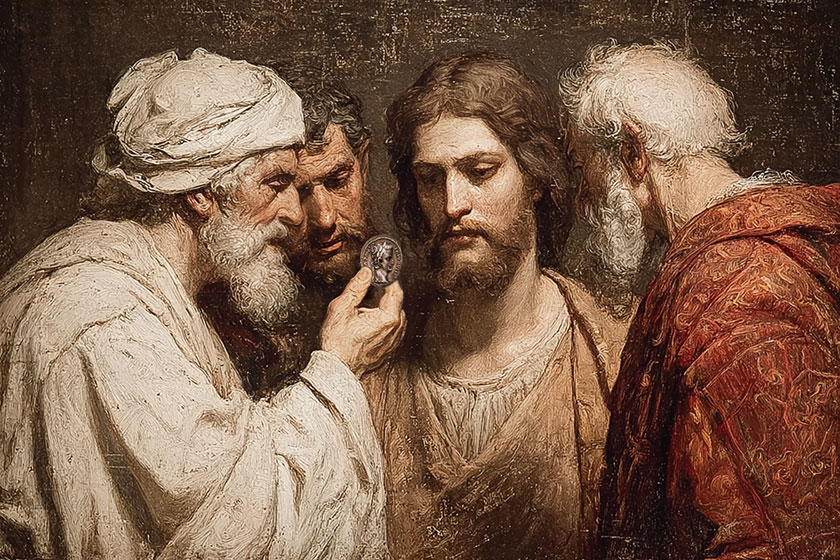Why God allows suffering in the world Deutsche Version
Many people find it difficult to believe in the existence of a good God, since the world is apparently anything but good. If indeed a God created the world, and if this God is good, omniscient or even omnipotent, why does so much evil and injustice happen in the world? Why doesn’t an all-powerful God intervene and put his creation in order? Is God not omnipotent after all, or is he even a sadist in the end who wants to see people suffer and die? These or similar are the arguments against a belief in God, or at least in a good God. The debate about why God allows suffering in the world is also called the theodicy question. The term theodicy comes from the Greek theodikía, from the ancient Greek theós which means God, and díkē, which means justice. It is therefore about the question of the extent to which God can be regarded as just at all in view of the injustice in the world. Or in other words, it is about the attempt to justify God’s actions.
The following article provides answers to the question of why God does not prevent suffering in the world, in direct reference to the statements of Jesus‘ message. Whoever follows the explanations with an open mind will open up a new perspective on the difficult, the suffering and the unjust. And whoever adopts this view will be able to rethink his life and understand it differently than before. In fact, a satisfactory answer to the question of why God allows suffering in the world is only possible on the basis of the teachings and the passion of Jesus. No other teaching gives this answer as conclusively and convincingly as Jesus does. If we find the deep meaning of the teachings and the passion of Jesus, we also find a fundamental answer to this question. The answer, however, is then no longer according to a principle of faith or dogma, but through a very personal insight into the correctness of Jesus‘ teaching. It takes place insofar as their statements are recognised as conclusive, correct and credible.
A message of salvation
In fact, Jesus of Nazareth is the first and the only teacher who directly touches on the problem of theodicy both in his message and in his actions. Jesus can be considered a redeemer insofar as he touches on this problem not only verbally but also physically and solves it in his passion in an unheard of and shattering way. Whether the healing of the sick, his preaching of the kingdom of God or the willing acceptance of his passion – everything is an expression of a mission that has only one goal; namely, to overcome the suffering of the world through the Spirit. At the same time, the redemption that he delivers to people is nothing distant, otherworldly or in the future, but happens directly today, here and now, as he says:
Jesus said, „Should not God do right by his chosen ones who call on him day and night, and should he delay in helping them? I tell you, he will do them justice immediately.
Luke 18:7-8
Amen, amen, I say to you: He who hears my word and believes Him who sent me has eternal life and will not come into judgement, but has passed from death to life. Amen, amen, I say unto you, The hour is coming, and it is now that the dead shall hear the voice of the Son of God; and they that hear shall live.
John 5:24-25
Salvation is based on the fact that Jesus, in his teaching, imparts an attitude of mind by which, where we accept it, we are reconciled with our lives. In this, reconciliation with our lives is reconciliation with God himself. Programmatic here is his call:
Change your mind, for the kingdom of God is now very close.
Matthew 3:2
This means: Change your mind! Be prepared to fundamentally change your attitude towards life. Let yourselves be touched by the message of the Kingdom of God.
A universal, all-encompassing image of God
First of all, it is important to understand that Jesus conveys a universal image of God in his teaching. Only on the basis of an image of God that encompasses all events is a satisfactory answer to the question of theodicy possible at all. Jesus‘ image of God is free of negative, human capriciousness in so far as this could be interpreted into the God of the Old Testament, who is also described there as a hating and jealous God. In the message of Jesus, God proves to be a faithful and loving Father. In his Son, he makes us children of God and puts all his passion into regaining the lost trust of man. Trust means to gain the certainty that God works all things without exception and thus all events serve us for the best:
But we know that all things work for good to them that love God, to them who are called according to the purpose.
Romans 8:28
Jesus‘ image of God is all-encompassing in that it sees our encounters with friend and foe, joy and sorrow, weakness and strength, living and dying, justice and injustice, etc. as synonymous. That is, Jesus no longer rejects the humanly deficient, but gives it essential meaning in his message.
This is the new, the extraordinary and universal core of his message, that even the unlovable must experience our love if we are to be perfect, as he says:
You have heard that it is said, „You shall love your neighbour and hate your enemy.“ But I say unto you, Love your enemies; bless them that curse you; do good to them that hate you; pray for them who
Matthew 5:43-48spitefully use you and persecute you; that ye may be the children of your Father who is in heaven: for he maketh his sun to rise on the evil, and on the good; and sendeth rain on the just and on the unjust. For if you love only those who love you, what reward will you receive? Do not tax collectors do the same? And if you are only kind to your brothers, what extraordinary thing are you doing? Do not tax collectors do the same? Therefore, be ye perfect, even as your Father who is in heaven is perfect.
Note the final sentence in which Jesus describes the nature of God as perfect. Perfect is that which is „complete“, that is, something that encompasses all things without distinction and excludes nothing.
God is perfect because he is also able to include in himself the opposite, namely the enemy, the evil, the suffering, the unjust, without endangering or losing his existence. God experiences a promotion of himself in all things, because apart from God there is nothing.
Only an all-encompassing and universal God is able to love all things, since he cannot be hindered, injured or destroyed by anyone or anything, but experiences promotion in all things.
If we think about it realistically, we have to admit that our human existence in this world would not be possible at all without the opposite: without death there is no life, without sleep there is no wakefulness, without darkness there is no light, and so on. The whole truth is indivisible: if there were only light, we would not perceive light as such. In terms of our human life, this means: our own life can only become perfect in the sense of Jesus if we include all things without exception in our life: illness, weakness, enmity, injustice, failure, dying, suffering and death.
Overcoming evil, in the sense of Jesus, means mentally overcoming the contradiction of duality that the suffering and burdensome represent for us.
All these negative phenomena are essential components of our human reality and for this reason we are to love them and longingly seek their meaning for us. This search for meaning and significance of the meaningless and insignificant is the only relevant search at all, because what we are looking for (God/Spirit/Sense) wants to be found by us just as longingly – because Spirit is looking for us just as we are looking for Spirit (Spirit/Sense).
Ask and it will be given to you; seek and you will find; knock and it will be opened to you. For whosoever asketh receiveth; and whosoever seeketh findeth; and to him that knocketh it shall be opened.
Matthew 7,7
Loving here does not mean that we should promote and find these things good in themselves, but it means that we should take them on trustingly and willingly when we encounter them or are at their mercy. For it is only through our trusting and willing acceptance that what has hitherto been hated and unloved can acquire meaning and significance and thus a profound transformation.
Then he said to them all: Whoever wishes to follow me, let him deny himself and take up his cross daily and follow me. For whosoever will save his life shall lose it; but whosoever shall lose his life for my sake shall save it.
Luke 9:23-24
An Individual Image of God – The Objective in the Subjective
Even though it can be said that the Christian image of God is an all-encompassing and universal one, Jesus nevertheless answers the question of theodicy in a purely subjective and individual way. That is, he does not answer the question of the suffering of the world in a political or collective sense, for its answer depends on individual „faith“ – it depends on the personal insight and consent of each individual to his message.
Jesus gave us his very personal answer to the suffering of the world in his passion, and he gives this answer to each individual who believes it to be true, who believes it and who is willing to accept it. His answer is:
Injustice, suffering and death can only experience a change of meaning for us where we take them upon ourselves and bear them in the certainty that there is a hidden meaning and significance inherent in all events.
Jesus consented to his passion because he had the spiritual ability to recognise the will of God even in the actions of his enemies:
And he walked a short way, and fell on his face, and prayed, saying, My Father, if it be possible, let this cup pass from me: nevertheless, not as I will, but as thou wilt. Matthew 26:39
Matthew 26:39
In a sense, Jesus, by this consent to his passion, „makes“ God the cause of injustice, suffering and death. God, on the other hand, who is perfect in principle and must therefore be the cause of all things, suddenly becomes, through the trusting consent of the Son, the author of something that He is not in essence. For God is being Himself and He is the cause of life itself, and this principle is undivided, that is, it is without alternative or counterpart.
Every kingdom divided against itself is laid waste; and every city or house divided against itself will not stand.
Matthew 12:25
Hear, O Israel: The YHWH our God, the LORD ist One.
Deuteronomy 6,4
God is life itself and no contradiction exists in Him, to the extent that it is impossible for the cause of injustice, suffering and death to lie in God at the same time. Therefore, these areas must undergo a change in meaning when they encounter God. They have undergone this very change in meaning because Jesus trustingly received them from the hand of God, thus bringing them into contact with God and filling them with spirit, meaning and significance.
Herein lies the deep meaning of the statement: Jesus suffered and died for us. Jesus knew that the suffering that a person takes upon himself in trust in God must lose its meaninglessness, indeed that only in this way can it find a new and higher meaning.
God, the hidden meaning in meaninglessness
„God is spirit“ is Jesus‘ definition. (Jn 4:24) But what does that mean? It means that only the Spirit is able to give meaning and significance to all things, but especially to the apparently spiritless and senseless. In terms of answering the question of theodicy, this means that the spiritless, which we take upon ourselves trusting in the Spirit (in God), is imbued with spirit and meaning, making it directly God. This is the divine principle of the fulfilment of meaning. Conversely, events that we reject as unacceptable out of mistrust in God (in life) must remain meaningless, because we exclude the power of the Spirit, which fills with meaning everything that can be filled with meaning. Powerful, then, we are where we see ourselves able to recognise God in all things without exception that cling to or encounter us. Powerless, on the other hand, we are where we categorically exclude his power and presence. Jesus made this spiritual principle clear to his disciples before his imprisonment:
Therefore my Father loves me, because I lay down my life that I may take it again. No one takes it against my will, but I leave it voluntarily. I have power to let it go, and I have power to take it again. This law I have received from my Father.
John 10, 17-18
The Passion of Jesus – Vacuum of the Spirit
To illustrate how the Spirit works in the context of answering the question of theodicy, I provide the following parable:
A vacuum is the negative pressure of air/gas within a space/vessel. A vacuum can only be as large as the stability of the vessel in which the vacuum is created, allows. If the negative pressure is too great, the vessel will be damaged and pressure equalisation will be necessary. Significantly, there are equivalents of the terms spirit and air in both the Hebrew and Greek languages. Thus the term „ruach“ = air, spirit, wind, breath, fragrance in Hebrew and the term „pneuma“ = spirit, breath, air, breath in ancient Greek. The original texts of today’s Bible have been handed down to us in these two languages.
Taking up the example of the air vacuum, one can transfer the idea of theodicy to the spiritual and say: Jesus created a vacuum of the spirit (God) in his teaching and in his passion, which the spirit filled when the vessel broke. Or in other words, the absence of spirit and meaning in a senseless situation „compels“ the spirit, provided one knows about the law of the spiritual vacuum, namely that the pressure equalisation must take place at the latest when the vessel breaks. The new atmospheric pressure is then the new normal – „outside“ the old vessel in a „larger“ space. The „larger“ space can be seen here as a symbol for the transcendent and the new, which points beyond the small and the old. But it is also a symbol of a new normality, a new creation:
In my Father’s house are many mansions. If it were not so, I would not have said to you, I go to prepare a place for you. And if I go to prepare a place for you, I will come again and receive you to myself, that where I am, there you may be.
John 14, 2-3
In his passion, Jesus deliberately places himself in the state of a spiritual vacuum, namely in a state of God’s absence – a state of spiritlessness, so that it can be filled with spirit.
Because for the one who recognises God’s will and presence in all events, a state of God’s absence can no longer exist.
Death is a state of absence of God. But God permeates and fills all things that allow themselves to be filled by Him. God is all in one and therefore God „must“ fill such a state of God-lessness and Spirit-lessness, and that through and with Himself, otherwise He would not be God. Jesus knew about this law, therefore he concludes with the words:
This law have I received of my Father.
John 10:17-18
Overcoming external evil
God is by no means powerless in the face of evil, but in Jesus Christ he deliberately seeks to touch and confront evil in order to overcome it and that is to make it good – to make it God. Only that which has been overcome by the Spirit has become truly „good“. And all that is „touched“ by God, that itself becomes God.
Jesus Christ is the direct touch of God with the suffering of the world.
Evil, on the other hand, is that which does not want to be touched by God, and in this respect it must remain spiritless and senseless for us. However, the events are not spiritless and senseless in themselves, but they are so with regard to our inner defence and our unwillingness. Thus Jesus does not conclusively evaluate the evil that happens to Himself as evil, but He understands it as something that experiences meaning through His trusting attitude, whereby it is overcome. For what is overcome by the Spirit has unexpectedly become something good. It is precisely this causality that Jesus declares in view of his imminent passion:
But now I go unto him that sent me; and no man of you asketh me, Whither goest thou? But because I have spoken these things, your heart is filled with sorrow. But I tell you the truth, it is good for you that I go. For if I go not away, the Comforter will not come unto you: but if I go away, I will send him unto you.
John 16:5-7
Note the basic statement of Jesus, „It is good for you that I go …“ But how can there be any good in the betrayal, injustice, torture, execution and death of a human being? How could Jesus find any good in the horrific event that was about to happen to him? He gives the answer himself: „For unless I go, the Comforter will not come to you …“ What does this mean? Through Jesus‘ sacrifice, a new spiritual consciousness will emerge, which will thereupon be available to all people seeking spiritual consolation in situations of human distress. In a sense, God is compelled to a new creation through the willing passion of Jesus. It is Jesus‘ trust in God’s omnipotence and it is the steadfast love in which Jesus gives himself that „compels“ God in turn to a new creation. Thus, through the passion of Jesus, a new human being has been created. And this new man is Christ, the overcomer. Christ gives this, his new identity, to all who longingly seek it, and whoever accepts it takes on the form of the Son of God – becomes a child (son) of God himself.
Therefore, if anyone is in Christ, he is a new creature; old things have passed away, behold, all things have become new!
Corinthians 5:17
In Jesus Christ, God directly shows how He would overcome evil if He were human. Since God is not human, he had to become human so that we humans could experience this principle of overcoming evil. In Jesus Christ, God becomes man and confronts evil himself, taking it upon himself to fill it with spirit and meaning:
It is good for you that I go …
John 16:7
The hidden meaning in the hitherto senseless gives meaning and significance to all senseless events. Everything spiritless and senseless that is thus fulfilled by God (Spirit) must now become good. And just as Jesus knew the meaning and significance of his own suffering and death, we too are to trust in the meaning of our own suffering. For through his willing surrender on the cross, it should become clear that this meaning will now come wherever we trustfully seek it. That is why Jesus took injustice, suffering and death upon himself, so that we too can now trust that meaning wants to dwell in all events where we long for it and let it in. In truth, meaning has always dwelt in all events, because without God (spirit and meaning) nothing can be and the spirit permeates everything and fills it with life. All existence, all life depends on meaning. But as long as we do not want to believe this, we have no share in a life beyond the spiritlessness and nonsense in the world.
Everything, that wants to come to life must experience an all-embracing, underlying meaning.
All that was formerly lower, which has received spirit and meaning, has also come to life. This is the universal principle of creation, that God creates something out of nothing. The senseless, the spiritless, the lowly, the filthy, the shameful, the reprehensible and the condemned – this has always been the „stuff“ from which God creates new life.
Then YHWH the Lord made man from the earth of the field and breathed into his nostrils the breath of life. And so man became a living being.
Genesis 2:7
Overcoming the inner evil
Whoever internalises the message of Jesus will begin to look at the world in a new light. That which we have so far conclusively called evil or bad ceases to be evil and bad in the sense of Jesus.
Let us just think of our own arduous, embarrassing or even dangerous situations and experiences through which we have fundamentally matured or through which we have recognised or learned something important, something that in retrospect we no longer want to miss. Our human evaluations and determinations of good and evil are therefore by no means as ultimate and unambiguously true as we often think. Mostly they are time-dependent and appear to us already changed and sometimes even contrary with a time lag. As explained above, Jesus calls us to take a new, changed attitude towards the enemy, evil and bad, by accepting and taking it upon ourselves according to God’s will. But this does not only apply to the evil that we encounter from outside, but especially also to the evil that threatens us from within, that is, the evil that is inherent in ourselves.
The question of theodicy, why God allows evil in the world, must therefore be extended to the inner being of man. For the origin of the evil that people do to each other again and again does not lie somewhere outside, but rather lies within ourselves. This inner evil is also called the original sin of man. This original sin includes all human weaknesses, such as error, injustice, hatred, envy, resentment, vindictiveness, baseness, mercilessness, etc.
According to Jesus‘ teachings, our own human weaknesses and shortcomings should also be able to find deep meaning and significance.
But what meaning could there be in our human weakness and fallibility? Jesus‘ answer is simple:
Man should practise forgiveness and mercy, he should deal graciously with the faults of his fellow men, precisely because he himself is in need of forgiveness, mercy and grace:
Blessed are the merciful: for they shall obtain mercy.
Matthew 5:7
Judge not, that ye be not judged. For with what judgement ye judge, ye shall be judged; and with what measure ye mete, it shall be measured unto you. But why seest thou the mote that is in thy brother’s eye, and perceivest not the beam that is in thine own eye? Or how can you say to your brother, Stop, I will pull the mote out of your eye, and yet, is there a beam in your eye? You hypocrite, first take the beam out of your own eye; then see how you take the mote out of your brother’s eye.
Matthew 7, 1-5
When our impulse to exercise grace, forgiveness and mercy stems from the realisation of our own fallibility, our human imperfection suddenly takes on meaning and deep significance.
In order for us to be able to forgive other people’s guilt, we ourselves must realise and acknowledge that we are guilty. That is, we must become willing to practise self-knowledge. And herein lies the deep meaning of our human fallibility. What has found meaning has found spirit and what has found spirit has found God. What has found God has ceased to be ungodly. And what has ceased to be ungodly has ceased to be our harm, and that means it has ceased to be sin. Jesus‘ teaching of the fundamental forgiveness of our guilt by God is based on this causality. Our guilt is fundamentally forgiven insofar as we ourselves become willing to forgive those who are guilty of us, precisely because we know of our own fallibility.
And forgive us our trespasses as we forgive those who trespass against us.
Mat 6, 12
For if you forgive men their trespasses, your heavenly Father will also forgive you; but if you do not forgive men their trespasses, neither will your Father forgive your trespasses.
Mat 6, 14-15
Resurrection to new life
In the parable of the grain of wheat, Jesus clarifies the meaning and significance of his own passion. Here he symbolises that all human dying in this world must have meaning and significance, just as dying in nature has always had meaning and significance.
Amen, amen, I say to you: Unless the grain of wheat falls into the earth and dies, it remains alone; but if it dies, it bears much fruit.
John 12:24
Only insofar as our dying also experiences a necessity can our life experience a fundamental promotion. And this promotion consists in serving a new, transcendent understanding of life. Jesus answers the question of why God allows suffering in the world by ascribing a fundamental meaning to all dying in this world. The meaning of death and dying stands and falls with the knowledge of the transcendent – of that which points beyond the temporal and the superficial:
… but if it dies, it bears much fruit.
John 12:24
Just as the processes in nature teach us, so, according to the teachings of Jesus, every sacrifice and every willing surrender should serve to bring about new, greater life. Whether we ourselves participate in such new life depends on the trust that makes us capable of willingly giving and leaving old life in the spirit of Jesus. For we have to leave our temporal life anyway. But as long as we do not want to accept the reality of our mortality, as long as we negate and ignore it, and as long as we want to hold on to what we cannot hold on to, our dying cannot experience any meaning, because we oppose the truth of our mortality. Jesus taught „how“ our dying can experience that meaning so that it attains immortality. All letting go, renouncing and dying, must be done for the sake of insight into an incontrovertible truth. That is to say, right there, where our outer dying is given a transcendent meaning, our dying is no longer done in vain. In His suffering and death, Jesus had recognised a necessity for Himself, namely that through His death a new spiritual consciousness would be created that would benefit all people who seek it. His individual sacrifice, His suffering and death bore „fruit“ for many – for all those who in turn can now give and leave their lives in His spirit, whereby they too experience renewal through the spirit: This is the principle of resurrection. The resurrection of Jesus is the resurrection of an understanding of life that has already here and now transcended the time-bound and the superficial:
Those who say, „The Lord died first and then rose again“ are in error. For He first rose and then died. If anyone does not first obtain the resurrection, he will die.
Gospel of Philip Proverbs 21
It is a timeless, an eternal understanding of life, which cannot be diminished or hindered by anything in the world, but which now receives promotion through all events, even through injustice, suffering and death, as Jesus taught:
I am the resurrection and the life. He who believeth in me, though he were dead, yet shall he live: and whosoever liveth and believeth in me shall never die. Do you believe this?
John 11:25, 26
This is by no means an exhaustive answer to the question of theodicy, but this contribution could perhaps give an impression of the fullness of Jesus‘ message. Additionally, I do not wish to tire the reader. Therefore, I look forward to your critical questions and comments, which I will gladly reply to here. And so I conclude with the words of Jesus:
In the world you are afraid; but be of good cheer, I have overcome the world.
John 16, 33

The Resurrection – The Isenheim Altar / Colmar 1512-1516 – Artist: Matthias Grünewald







Hinterlassen Sie einen Kommentar.